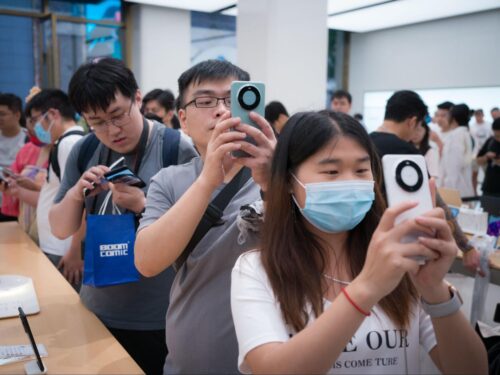U.S. lawmakers show Huawei the highway


A deal for Chinese smartphone and network hardware manufacturer Huawei to distribute its phones to AT&T mobile customers in the U.S. was cancelled, days before the partnership was to be announced at the CES tech fest in Las Vegas this week.
- “Huawei executives had viewed the AT&T partnership as a crucial move to gain a foothold in the U.S., the world’s largest market for phones that cost more than $500,” according to (paywall) the Information, but “the deal fell apart last week amid pressure from U.S. lawmakers who viewed Huawei as a security threat.”
- “This is really, really bad for us,” a senior Huawei executive told the Information, which additionally reported that he was “stunned by the deal’s collapse.”
- The setback is significant: as the deal was killed because of “political pressure,” it’s hard to see Huawei being able to line up alternative partners.
- The deal’s collapse “will threaten Sino-U.S. trade ties — and Beijing should consider ‘countermeasures’ if the situation escalates,” according to a former Chinese commerce official quoted by the South China Morning Post.
News flashes
- “We suck, but China does too.” That’s what scholar Elizabeth Economy says about China’s chances of assuming global leadership from the U.S. in the age of Trump.
- What is the relationship of China’s Social Credit system — a plan to give financial, moral, and political scores to all of China’s citizens — to Sesame Credit, the Alibaba-affiliated, consumer credit rating service? China Law Translate explains.
- Hu Shuli 胡舒立, perhaps China’s most respected working news chief, announced that she will step down as editor-in-chief of the financial news organization Caixin. Her longtime managing editor Wang Shuo 王烁 will replace her. Wang had a fundamental roles in Caixin and its predecessor Caijing’s rise, so it is unlikely there will be much change in the organization’s reporting.
- An American mother teaches her children how to be Chinese in China is the subtitle of Chinese Lessons, the memoir of Financial Times journalist Patti Waldmeir’s time in Shanghai with her two adopted Chinese daughters. The Kindle version is available free for a limited period of time at this link.
- Former New York Times Beijing bureau chief Ed Wong has penned a farewell (paywall) to his ancestral homeland, and it’s not optimistic. He concludes: “But for now, the Communist Party embraces hard power and coercion, and this could well be what replaces the fading liberal hegemony of the United States on the global stage.“
- “Left and right agree: Get tough on China,” says Walter Russell Mead, writing in (paywall) the Wall Street Journal. He says that the one thing uniting the fractious American polity — from Silicon Valley to organized labor, from Republicans to Democrats — is anxiety about China.
- Gangster rap is not on the agenda: the nationalist tabloid Global Times warns that “China hopes to transform local hip-hop into a positive influence but will punish those who cross the line,” but that “patriotic hip-hop” is quickly progressing “as rappers repent past deviations.” The mini-campaign to tame rap music started after rapper PG One was denounced by the Communist Youth League last week for promoting drug use and insulting women.
Watch our new video, buy our Red Paper
- The January 2018 The China Project Red Paper is a review of everything you need to know about the most significant events in politics, business, tech, culture, and society in China in 2017, plus the outlook for 2018. It’s only $8.88 per download: click here to buy.
- Today we’re trying a new type of video: watch Trump vs China — a timeline, ideally with the volume up high, and tell us what you think by replying to this email or writing to editors@thechinaproject.com.






